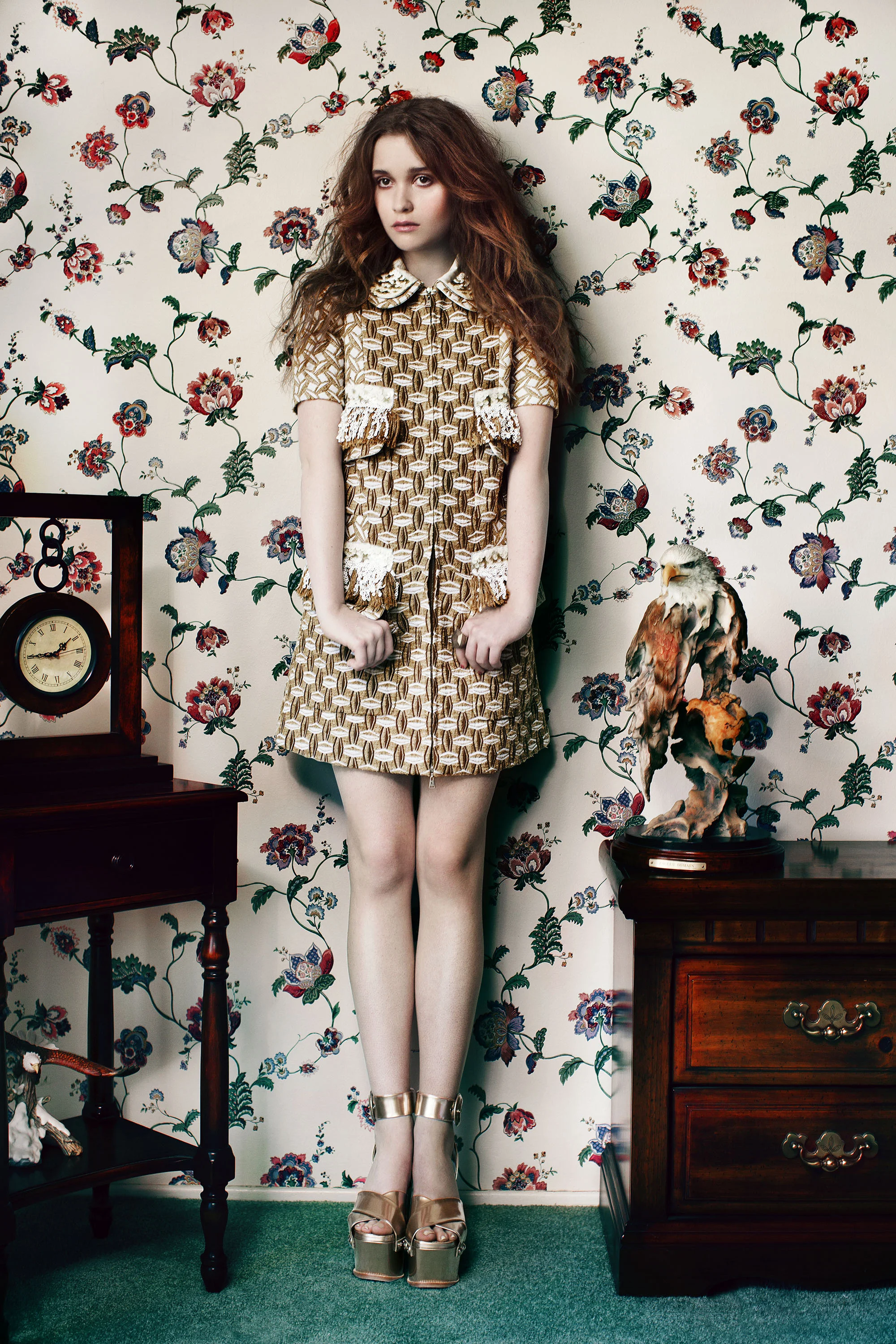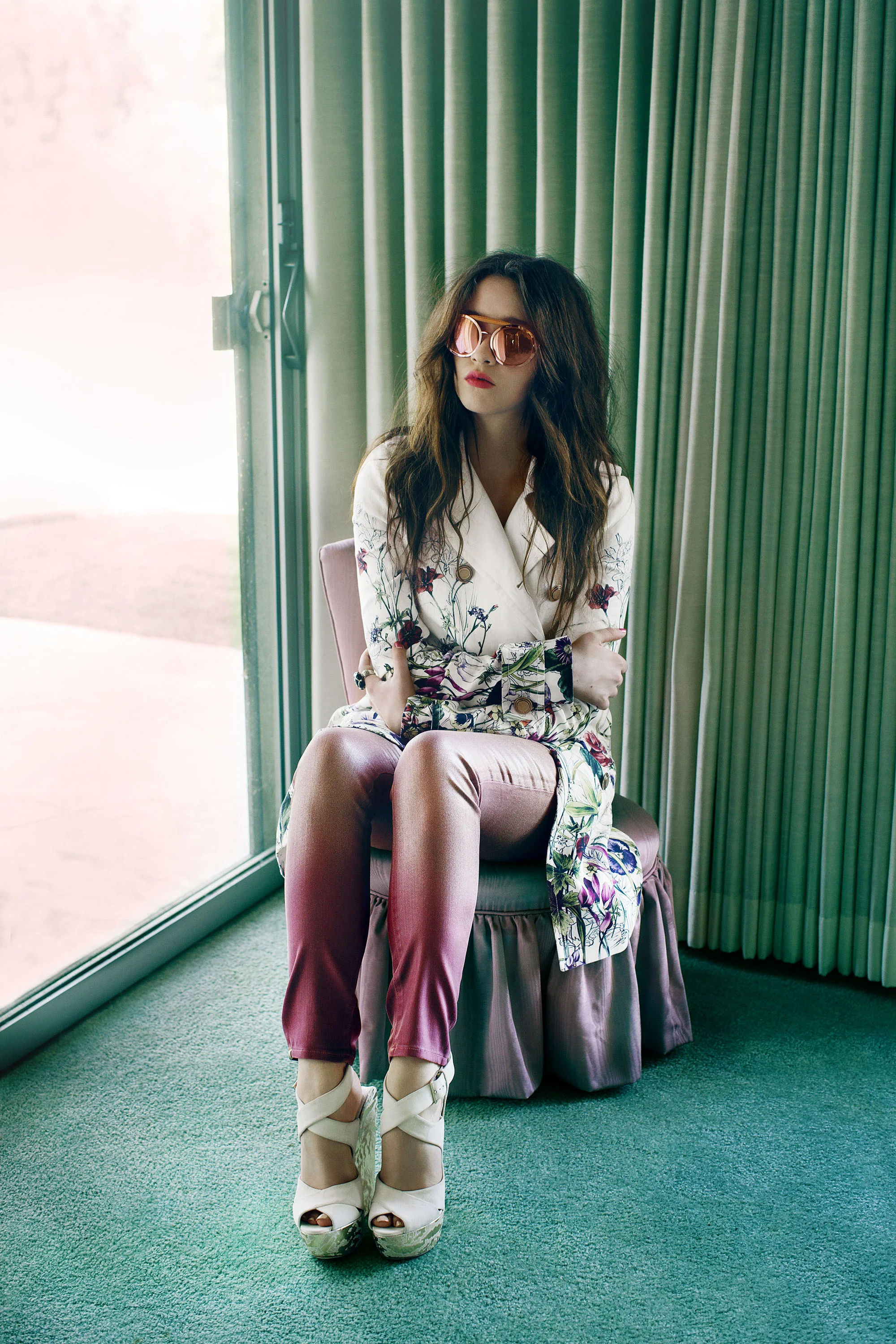Alice Englert
by Mui-Hai Chu
Alice Englert
Throw Open the Curtains, Alice Englert’s Future is Bright
This is the story of how I meet Alice Englert. The story of my attempt to translate a captivating character into a kind of serviceable reading material and to highlight the following attributes: beautiful, sincere, wry, self-aware, noble, humorous, innocent, wise.
The location is Musso & Frank’s, a sort of vestigial establishment from the days of ’30s Hollywood glamour that gives a strong impression it employs generations of families. The waiters wear old, ill-fitting red jackets and black slacks. A classic attire. Our waiter today carries a kind, rough smile and a husky voice. He doesn’t seem like he’s from here, yet he seems like he could have been born here, right here inside Musso & Frank’s.
Englert arrives on scene in a peach button-up shirt tied at the waist, double-pleated black trousers, a prim and proper leather purse in hand, and this season’s wine-colored Miu Miu heeled and fringed loafers. She is all cool.
At four in the afternoon, the restaurant is deserted, and it is a surreal place to meet a starlet. Then again, after meeting Alice Englert, I wouldn’t call her that. Only because, in this climate, everyone’s a “starlet” and the word has become nearly derogatory. No, foremost, I will conclude to you now that she is an intelligent and interesting human being who spends her time excelling at the artistic crafts of acting, singing, songwriting, and writing fiction. This should suffice.
But, “Who is Alice Englert?” you still ask. Because this world is based on facts: Englert is the star, alongside Elle Fanning, in Sally Potter’s riveting Cold War period drama Ginger & Rosa, in which she is absolutely sublime as the innocent, preciously love-obsessed child mistress Rosa. Her turn in this film, her first feature length, won her a nomination from the British Independent Film Awards for Best Supporting Actress. Next year sees her as the lead in three more films. One, Richard LaGraverese’s highly-anticipated supernatural adaptation Beautiful Creatures; Jeremy Lovering’s psychological horror flick In Fear; and Roland Joffe’s sweeping epic, Singularity. All these directors cast her under weird circumstances, without having seen any of her previous film work. She is that strong, or captivating.
“No, no,” Alice says, “I want something fat and juicy.”
This is her reply to the waiter’s inquiry on our steak preference and his suggestion of the filet, or even the petit filet. This, he would say, is the leanest cut. He perhaps has made his own assumption that based on the fact that here sits a pretty, fashionable girl, she will be like so many who deprive themselves of the wonderful things in life. No, no. See, we are not here to pose an interview, discuss topics of international concern (though we do), or meet one another; we are here to eat.
Specifically, steaks. And fries.
“Do you like clams?” Alice asks me. She pauses, perhaps waiting for me to lie through my teeth, because most people are appeasers. “Be honest,” she adds, her deep brown eyes levitating towards me.
And linguini and clams.
The waiter jokes in his husky convivial way, laughing, “Someone’s hungry huh?”
Alice laughs back. And then apologizes numerous times for her hunger, as she was on set all day without food or water.
“I always feel nervous when I get off the plane in L.A. because I don’t drive, and paired with a love of steak, you know, it’s not a good first date with me in L.A.,” she jests. Her laugh is low, her voice is throaty and languorous.
Suddenly she asks, “Have you been to Venice?” I answer affirmatively and the conversation meanders. She fires off a string of other questions. What was the first car you owned? What was the first song you listened to when you were in that car? Did you vote? Do you have a favorite book? What do you believe in? Are you religious or spiritual? “I’m not religious either,” she’ll say, “but I do think that religion says a lot more about humanity than it could probably ever say about God. And that is why I find it interesting.” It can be said here that she is better at interviewing than your “interviewer.” Because she thinks like a writer.
Her approach to acting is as such: “I always wanted to write and direct movies. I never really wanted—decided—to be an actress. I grew up with stories, with films. It was the only way I connected to life and to people—through stories. And I always wanted to be involved in this world and this life through telling stories and trying to understand people, and love, and, everything. When I was a kid, I wanted to write novels and then I wrote music for awhile, and then my mother [legendary Oscar-winning director and writer Jane Campion] was doing The Bright Star, and I was there on set, and there was just something about the delicacy and the sort of strength and roughness of the passion that some of the people had … just watching all these different people with their different lives coming together, and then just stopping for thirty seconds while someone just talks. To hold that silence and just that moment, appreciating it …” Her eyes are lost, she sweeps a hand through her full reddish brown hair.
“Also, I think, because there is no practical use for art, for film, for stories, yet it’s the most needed thing.” She pauses apprehensively now, aware of her rather passionate moment. “Well for me, at least,” she smiles.
I agree wholeheartedly.
“Good!” she exclaims and continues, “I think it doesn’t save lives, but it makes lives better. I think it was around that [Bright Star] time, we were in England, and I was fascinated, and I guess maybe I fell in—” she then sings, “fell in love” with a twang of vibrato that is more comedic than serious.
The food arrives. She gushes. She elates. We eat. Not much is spoken. Knife to meat, fork to mouth, chew and repeat, until knife to bone. “I’m really, really, really happy,” she says this almost wistfully after we finish. I remark that I can trust her now that I know she enjoys food. It’s a simplistic way of judging character, yet always so true and dependable.
“Yeah, well people say that your approach to food and your approach to sex can be similar.” She pauses and laughs. “That sounds weird now that I’ve gone on about my steak in the way that I just have.”
We laugh and continue back to upbringing. “I went to an Anglican school, a Quaker school, a hippie school, a school for dyslexic people, a progressive school for senior students who were getting a second chance, and an international school,” she lists masterfully, “but I’m not any of those things.”
Why so many different schools? Many actors drop out of school. It’s a discussion, it’s a planned execution for the pursuit of art. In Alice’s case, it was the same, but perhaps a different sort of execution. She dropped out twice and cites cheerfully that they are of the best decisions she has ever made in her life. Her first attempt at 15 was during a health class filming of The Breakfast Club. “Someone said that they thought the dark haired girl was really weird, which I thought was too funny because I mean, that’s the point. This is the point. This is the film about the fact that people are human beings and not just freaks and weirdos.” So she feigned illness, called her mom, and left. She gave it another try at another school, and left again, this time successfully. “Yeah, so it doesn’t stop me from being whatever. I’m still aspiring to be a pretentious wanker anyway,” she laughs.
On the topic of pariahs and persona non grata, I ask her of her role as the outcast “caster” (witch) in Beautiful Creatures. She plays a 16-year old girl, faced with the ultimate decision: light or dark? Good or evil? An impossible quandary. The film ultimately addresses the equal existence of both in the world. This dual harmony attracted Englert to the role, in addition to her “real soft spot for fantasy films.” She elaborates thoughtfully, “I think that, when done well, they can allow people to experience a metaphor, or an idea that, in reality, is too difficult for them. I think that the fantasy world is a place where you can have heroes and villains and confusion and complicated people and talk about moral values and love and fear. And because we’re not saying this is our world, we don’t feel threatened. Personally I think people should feel a little threatened. I think that’s good. I like being a bit uncomfortable.” She asserts this without hesitation and without any sense of superiority, as though this proclamation to disavow comfort, the most primitive desire and what most of us long for, were her repudiation of the human race. She clarifies further, “I think that happiness isn’t about being comfortable. You sit somewhere and you’re comfortable and about five minutes later something starts aching. This is life. Life isn’t about comfort; it’s about conflict and friction, you know? And that is what I’m interested in.”
At this point, the conversation feels endless, fueled by the energy that only a good steak can give. We discuss books. Her dad, producer and director Colin Englert, has recently dictated that she must read all the great Russian novels, giving her Dostoevsky’s The Idiot and Turgenev’s First Love, her favorite at the moment. And tucked inside her leather satchel is another Turgenev, Home of the Gentry.
Other talents? She can swear in French and can, with gusto, deliver a fatal “go get ass fucked.” She has ridden horses bareback throughout New Zealand and fenced briefly too. She downplays her talents on guitar and vocals. “I play guitar, but not well,” she tells me, and says her voice is incredibly low and her influences are Leonard Cohen, Nick Cave, and Tom Waits. She sings a cappella in In Fear, and Beautiful Creatures bought one of her songs, “Necessary Pains.” She is thoughtful. While in hair and makeup at a later point, she listens to Elliott Smith on her phone and says to me, “But I always think it’s so funny that people are so drawn to people who are so depressed. It’s like, ‘And you want to be like this?’” As to the fiction she is working on, she smiles lazily, “Heaps of crap, you know, from my mind.” This self-deprecating attitude is a hallmark of character. “That’s because I’ve spent too long in England,” Alice explains. “My agent told me before I came to America, ‘Don’t tell people you’re crap, Alice. You have to say, ‘I’m good. I am great.’”
Looking at a recent picture of Alice from the Toronto Film Festival with the notable cast of Ginger & Rosa, it’s interesting to note that while everyone else is a bit posed and aware of the camera in that way that celebrities often become aware by second nature, Alice is purely, just there, languid, in the moment, smiling, probably uncomfortable.





